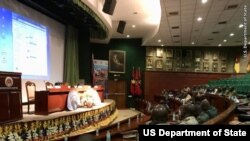For over 60 years, UN peacekeeping missions have operated in some of the most dangerous and difficult environments in the world.
Peacekeepers provide stability and prevent fresh outbreaks of violence, and in doing so, assist war-torn countries in their transition from conflict to peace.
As today’s security challenges have grown more complex and dangerous, UN peacekeeping missions often include political, military, and human rights aspects that have caused us to ask more of our peacekeepers. They are expected to de-escalate tensions, prevent fresh outbreaks of conflict, and protect civilians. This level of complexity makes comprehensive training imperative.
The United States and India have a long history of supporting international peacekeeping efforts. The United States is the largest financial contributor to UN peacekeeping operations while India is one of the largest contributors of peacekeepers. So it only makes sense that these two countries would be involved in the training of UN peacekeepers.
In July the two countries jointly hosted the second annual U.S.-India UN Peacekeeping Course for African Partners, which is a three week course for military personnel who train peacekeepers in their own countries. The course aimed to build the capacity of African nations contributing troops to UN peacekeeping missions, and covered topics dealing with operational and logistical matters and humanitarian issues. Military officers from Benin, Ethiopia, Ghana, Guinea, Kenya, Malawi, Namibia, Niger, Nigeria, Rwanda, Senegal, Sierra Leone, South Africa, Tanzania, Togo, Uganda, and Zambia attended the course.
This training will help ensure that a new generation of peacekeepers will achieve the highest standards necessary for mission success. MaryKay Carlson, U.S. Chargé d'Affaires in New Delhi, described the significance of the course and the larger peacekeeping cooperation effort between the two countries as part of “the transformation of the U.S.-India bilateral relationship into a global partnership.”
She continued, saying, “The United States and India are working together not only for the benefit of our two nations’ citizens but also to improve lives across the globe. The designation last year of India as a Major Defense Partner of the United States further underscores the importance of our two nations as net security providers in the global arena. This course is a great example of what we are doing together.”














